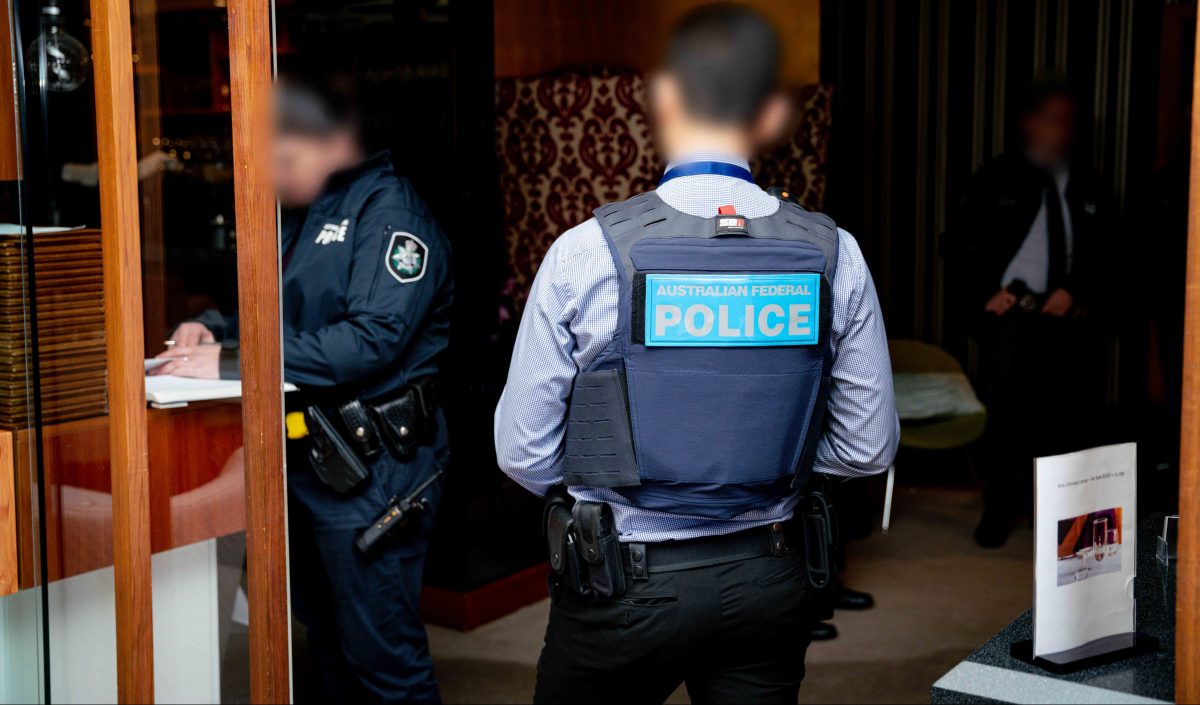
Police raided Courgette on 12 August 2021 over the money laundering scheme. Photo: ACT Policing.
Legal representation for the cannabis dealer for whom Courgette chef James Mussillon laundered money has argued he should spend no more time behind bars.
However, the prosecution is seeking more jail time, describing Mohammed Al-Mofathel as the “mastermind” behind the illegal offending for which Mussillon has already been sentenced.
The now-31-year-old was previously committed to trial over his role in the offending but ended up pleading guilty in December 2023 to six offences: a rolled-up charge related to the laundering of between $520,228 and $525,228 over an almost five-and-a-half year period, trafficking 21.5 kilograms of cannabis, procuring perjury, making false evidence by commission, knowingly concerned general dishonesty, and contravening an order to tell police the passcode to his phone.
The agreed statement of facts showed a tangled relationship between Al-Mofathel and Mussillon.
Al-Mofathel bought Water’s Edge Restaurant from Mussillon sometime in 2015 (before relinquishing ownership, although he claimed to still be the manager). He was also receiving payments as if he were an employee at Courgette.
The amount transferred to Al-Mofathel from Mussillon labelled as “boss pay” or “courgette pay” between March 2016 and November 2017 totalled $228,000.
Mussillon acted as a witness for Al-Mofathel in an unrelated court matter in June 2020 and falsely told the court that Al-Mofathel was an operation manager at Courgette Restaurant.
Court documents also showed Al-Mofathel’s connection to a number of cannabis grow houses in Canberra and references to trafficking the drug.
Police discovered 21.5 kg of cannabis in the tray of his vehicle and $14,500 in his backpack when he was pulled over on 4 July 2021.
Search warrants were executed at the Courgette Restaurant on 12 August 2021 and $130,000 in cash, electronics and documents were seized. Officers also searched Mussillon’s Bonner home and seized several items – including a Lamborghini and black BMW – and a Holt address where Al-Mofathel and some family members were present.
Al-Mofathel has been in custody since then.
During a pre-sentence hearing at the ACT Supreme Court on Friday (12 April), Al-Mofathel’s Legal Aid lawyer, Sarah Baker-Goldsmith, argued that her client shouldn’t spend any more time behind bars.
“He has done a significant amount of time on remand … perhaps on the cusp of having done enough,” she submitted.
Ms Baker-Goldsmith said a number of his crimes were the same as Mussillon’s, who had received a 12-month jail term followed by a two-year good behaviour order, and that the others were only through an extension of criminal responsibility. A pre-sentence report assessed Al-Mofathel as suitable for an intensive corrections order.
She argued that Al-Mofathel had accepted the “likelihood” he was the “instigator” of the money laundering but wasn’t the “ringleader” or “controlling mind” of the criminal enterprise. She also submitted that there was no evidence he had coerced or pressured Mussillon.
Ms Baker-Goldsmith said the trafficking cannabis offence should be seen at the lower end, as while 21.5 kg was a significant amount, the weight should not be “the be-all-and-end-all”.
“[It doesn’t] cause the same degree of harm as, say, [the same amount] of methamphetamine,” she submitted.
Ms Baker-Goldsmith argued her client was remorseful about his actions but had felt “self-obligated” to support his family.
Prosecutor Trent Hickey argued Al-Mofathel should be given a harsher punishment than Mussillon.
He argued that Al-Mofathel’s claims in a pre-sentence report that he had committed the offending to support his family weren’t true and that he was, in fact, the “mastermind” behind the offending.
“It was for greed, plain and simple,” Mr Hickey submitted.
The court documents contained details that Mr Hickey submitted showed the “dynamic of the relationship” between the men and that the money laundering through Courgette “wasn’t just a one-off enterprise”.
He also pointed out that while Al-Mofathel was only facing one count of money laundering, it covered at least 100 individual transactions over five years.
“This has to be at the high-end range of objective seriousness,” Mr Hickey submitted.
He argued the money laundering through “sham” Courgette wage payments (where Al-Mofathel gave Mussillon the money, which was then paid back as wages) was an exploitation of Mussillon, given the man’s autism diagnosis, so their sentences shouldn’t be compared.
“[A] lenient sentence would send all the wrong messages,” Mr Hickey submitted.
Justice David Mossop will hand down his sentence on 22 April.

















Bill Stone money for hospitals does not come from tne same pocket as money for transport. Funds are… View